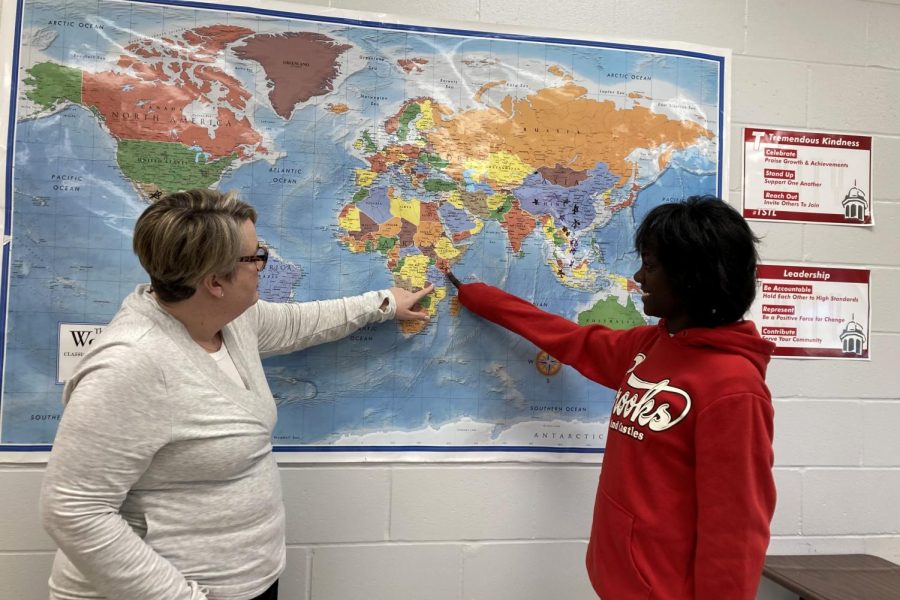AP Testing Season Underway
Judith Dickson and Esther Oyunge ‘25. Dickson has led her students through more than a thousand years of world history over the past eight months.
May 4, 2023
As the May weather brings flowers, you may notice City High students slumping down the hallways as if carrying the weight of an entire year’s curriculum on their shoulders. For these students, May is unavoidably difficult and stressful due to AP testing. These tests, the culmination of a year’s worth of Advanced Placement curriculum, are notoriously long and grueling.
Judith Dickson, an AP World History teacher at City High, has led her students through more than a thousand years of world history over the past eight months. With less than two weeks to spare, they are doing cumulative revisions in class and taking practice tests. Reality sets in as they count down the days until they will take the exam.
“It’s very stressful watching my students prepare to take the test,” Dickson said. “I am just as vested in their performance, and in their effort, as they are.”
AP classes are at a college level in a number of subjects and provide an opportunity for students to challenge themselves with difficult material. Dickson emphasized the importance of learning new skills, especially with regards to reading, writing, and historical analysis.
“It’s a higher-stakes exam [than most],” she said. “There is a much greater amount of reading than normal. And there are various different strategies and approaches to writing.”
Scores will be released in July, on a curve of one to five (five being the highest score possible). AP scores can also be used as college credit, typically if the student earns a four or five. However, Dickson said she does not think that the AP test score is the most important thing a student learns from the experience of taking an AP class.
“To me, the most important thing is: Did you learn something? Did you put yourself into a different type of learning situation? Did you experience high-stakes testing? Did you get experience working with primary sources? And above all, did you challenge yourself? I think that that’s key. Most students have probably never done those things before, and I think that experience and that exposure is invaluable.”
Esther Oyunge ‘25 is taking AP World History this year and it is her first AP test. She thought the class was more difficult than average but that it has been an enjoyable experience overall. Oyunge was born in Kenya and grew up speaking Swahili as her first language. She liked learning about the context surrounding the Swahili language in East Africa.
“I didn’t know that they spoke Swahili in other places other than Kenya, so when I learned that, I thought it was really cool,” Oyunge said.
Oyunge has found it interesting to learn about other cultures through two lenses: one American, one Kenyan.
“I’m able to observe other cultures and compare it to mine whereas everyone else has to understand different cultures [from just an American perspective]. . . For example, I realized that Indian culture is very similar to Kenyan culture, at least a little bit, like they have similar foods,” she said.
This year, the District decided to put certain exams online instead of on paper. Oyunge is glad about the decision.
“Doing testing on paper is pretty stressful,” Oyunge said. “Because you can’t really see the timer. I also like being able to go back and forth by clicking a button, instead of flipping through [piles of] paper, so being online will help a lot.”
Ashley Bentler ‘24 is taking five AP classes this year: AP Calculus BC, AP Chemistry, AP Physics, AP United States Government, and AP Literature. Bentler said that AP classes are stressful for a variety of reasons.
“They cover an entire year’s worth of learning,” Bentler said. “Which means having to carve out extra time on my already busy schedule to brush up on topics I may have forgotten.”
According to Bentler, the possibility of getting college credit increases the stakes.
“Most colleges only accept 4’s and 5’s, so that adds extra pressure for sufficient performance. Alternatively, I think they can be beneficial in the end, because you are able to get a good amount of college credits if you perform well. This could end up eliminating tedious gen eds and lowering the cost of college in the long run.”
Bentler enjoys the challenge of academically rigorous classes. She believes AP classes will help her prepare for the heavier academic load in college.
“And even though not all of the schools I am applying to accept AP credit, it’s a great tool for college applications, because it demonstrates an eagerness to learn,” Bentler said.
On the night before the beginning of AP exams, Lucas Ralston ‘24 communicated by email that he would also be taking five AP tests.
“My hardest AP test has got to be either AP Chem[istry] or AP Spanish,” Ralston mused. “Chemistry is hard because there’s such a large volume of information that needs to be learned, and Spanish is difficult because I have to know the language pretty well.”
Ralston asserted that certain classes prepared him very well for his tests.
“It all really depends on the teacher, and if their teaching style suits the student,” he wrote. “In my experience, Mr. Schumann teaches to the exam really well, and prepared me for the [AP World] Exam splendidly last year. In the end though, success in large part comes down to individual preparation.”
Ralston intended to pace himself carefully on his two back-to-back AP Government and Chemistry tests.
“I’ll try my best to read questions as thoroughly and quickly as I can, since there’s not always a lot of time to complete sections,” Ralston explained.
After the fact, Ralston thought he had done very well on the AP Government test.
“But the Chemistry test was the worst test I’ve ever taken in my life,” Ralston said. “I almost died.”
Braeden Marker ‘23 is taking two AP tests this year: AP Music Theory and AP Calculus BC. Marker said that his outlook on AP tests has changed since he began high school, because he didn’t used to think that taking them was important.
“I avoided taking AP tests that I didn’t think would be useful to my career path,” Marker said. “But as I am realizing how real the possibility of changing interests in college can be, and how AP tests can count towards G.E.s in college, I’ve begun to regret not having taken more tests.”
Marker’s strategies for coping with stress includes pacing himself and “taking it one day at a time.”
“I’ve found that when you cram too much studying in too short of a time, or study for hours on end in a night, it all starts to blur together, and you end up even more jumbled,” Marker said. “I was also very realistic with myself about how many AP tests I would be able to handle, which helped tremendously.”
Sahleh Al-Herz ‘25 is taking AP Physics, AP Biology, and AP World. He is also self-studying AP Computer Science Principles. Last year he took AP United States History and AP Computer Science A.
Al-Herz said he thought that AP US History was more difficult than any other AP class he is currently taking. However, he is glad he took it as a freshman.
“I think it’s good that 9th graders take it, because then they’re super challenged,” Al-Herz said. “But after that. . . if they know that the next AP classes are not as difficult, they’ll feel better about taking them, since they’ve already gone through that [APUSH].”
Al-Herz said that he did not feel well prepared for his science tests.
“In AP Physics and AP Bio[logy], I think the class is too easy,” Al-Herz said. “And so although I’m doing well in the classes, I do not feel like I am prepared very well for those exams, so I’m having to do extra stuff at home, outside of school, to feel ready for those. . . Because when you’re taking the AP exam, the grade you get on the exam matters more than–or at least as much as–the grade you get in class.”
Despite taking four AP exams as a sophomore, Al-Herz said that he was not stressed out.
“I think my prospects are high, even if I do absolutely terrible on those tests,” Al-Herz said. “It would mean I’d have to take those classes [again] in college, and my transcript would look less good. [But it] doesn’t matter; it isn’t going to kill me. I just like to excel and try hard things.”
Judith Dickson also concluded that AP classes are definitely worth the challenge.
“[Teaching an AP class] is a lot of work, but I like it,” Dickson said. “One great thing about teaching an AP class is that our class camaraderie is really tight. I feel like we really build a positive atmosphere and good relationships, because the class is so hard. And I think you don’t get that in all of your other classes. And going back to educating yourself–the problem with teaching world history is you’re never going to know everything, and it’s humbling. You have to admit, ‘Gosh, I don’t know. I have to look that up.”
“When AP Tests are over, I will feel relieved,” Dickson said. “Because I am just as stressed as my students are.”

































